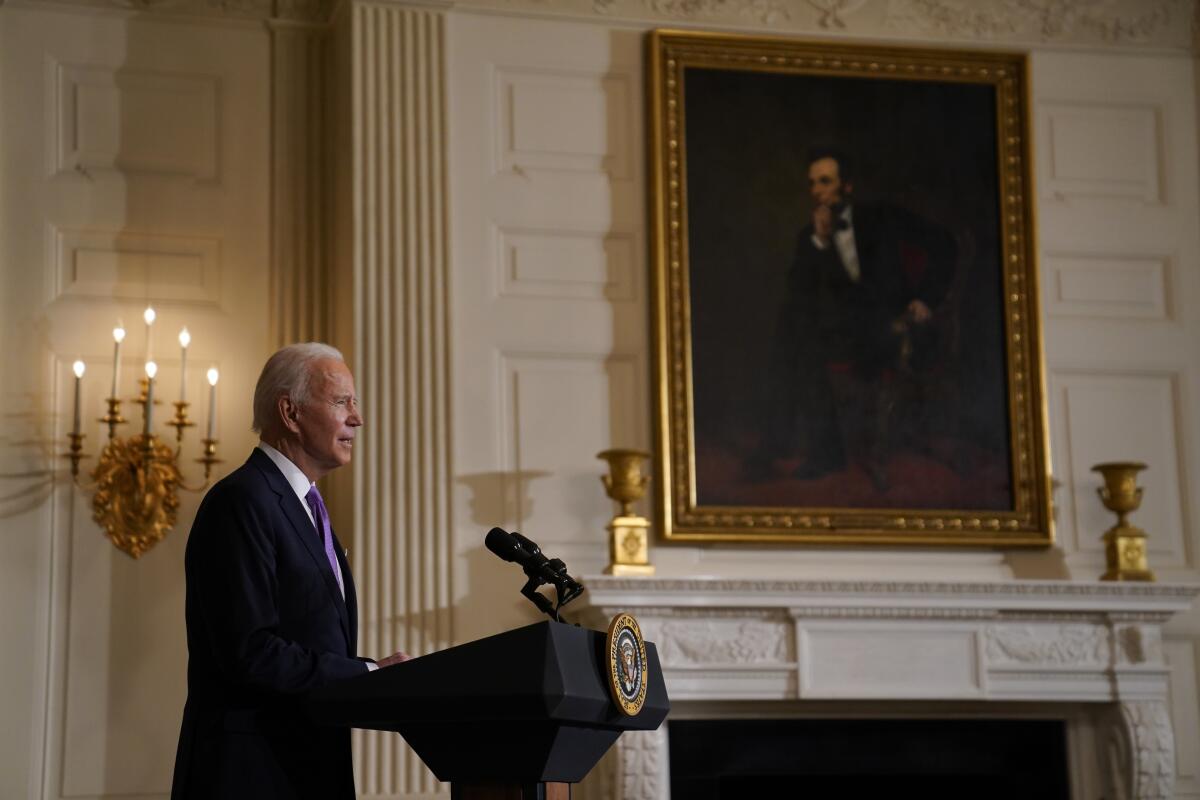Biden promotes racial equity for Asian Americans in wake of Trump’s anti-China talk

- Share via
WASHINGTON — President Biden took action Tuesday to disavow another aspect of his predecessor’s legacy — racial animus toward Asian Americans, hostility that rose sharply during a pandemic President Trump blamed on “the China virus.”
Biden’s executive order, one of four addressing racial equity that he signed at the White House, called for providing the Justice Department with additional guidance and resources to more accurately track hate crimes and harassment of Asian Americans.
In remarks from the White House, Biden referred to an increase in xenophobic attacks against Asian Americans and added: “This is unacceptable and it’s un-American.”
The directive also spurred federal agencies, including the Department of Health and Human Services, to examine whether there are xenophobic references in policies, memoranda or public guidelines from the Trump administration and, if found, to remove them. Additionally, Biden tasked the health department with developing language and cultural guidance related to COVID-19, assuring that vaccine and health information from the federal government is available in more languages.
Another executive order reinstated and expanded a fair-housing regulation from 2015 that Trump repealed last year. Biden also signed a statement recommitting the government to respecting tribal sovereignty and strengthening the relationship between the United States and Tribal Nations. The fourth order halted the Justice Department’s use of private prisons, which have been widely blamed for exacerbating the disproportionate incarceration of people of color.
The actions are the latest in a series of daily executive actions focused on various policy themes, and an explicit rejection of the xenophobia and racism that was increasingly evident during the last four years.
Biden cited last summer’s Black Lives Matter protests as “a turning point in this country’s attitude towards racial justice” and said America must try harder to live up to the founding principle that all men and women are equal.
“I ran for president to restore the soul of this nation,” he said. “And the simple truth is: Our soul will be troubled as long as systemic racism is allowed to persist. We can’t eliminate everything, but it’s corrosive, it’s destructive and it’s costly.”
Framing his actions as a first step toward embedding the value of racial equity throughout the executive branch, Biden said that embracing and expanding diversity provides benefits for the country, as economists’ research has validated.
“For too long, we’ve allowed a narrow, cramped view of the promise of this nation to fester,” he said. “We’ve bought the view that America is a zero-sum game in many cases: If you succeed, I fail. If you get ahead, I fall behind. If you get the job, I lose mine. Maybe worst of all, if I hold you down, I lift myself up.”
Biden urged Americans to remember President Kennedy’s words that a rising tide lifts all boats. “When we lift each other up, we’re all lifted up,” he said. “When any one of us are held down, we’re all held back.”
Susan Rice, director of the White House Domestic Policy Council, echoed that point during an earlier appearance in the White House briefing room. “These aren’t feel-good policies,” she said. “The evidence is clear — investing in equity is good for economic growth.”
Rice said the administration plans to take additional steps within weeks to address concerns about racial inequities in policing and criminal justice.
Biden’s message was a clear rebuttal to Trump’s legacy of playing to anxieties and grievances of some white Americans about an increasingly multicultural nation, as well as to the white supremacist groups that grew and became more public during his tenure.
Hate crimes and incidents directed at Asian Americans surged almost immediately following the coronavirus outbreak in the late winter of 2020, a trend the Biden administration official blamed on Trump’s “offensive and dangerous” rhetoric and the “particular xenophobic propaganda” targeting Asians that he articulated at daily briefings, informal news conferences and campaign rallies.
“Thousands of Asian Americans have reported acts of hate and violence, and the vast majority live in a climate of fear,” the group Stop Asian American Pacific Islander Hate said in a statement.
The group, which formed last year to fight the growing discrimination, added: “What is most disturbing is that the rising hate was fueled by racist and xenophobic rhetoric used by the former president and his administration’s implementation of a number of policies and efforts to target our communities.”
Trump, even in his final remarks as president, referred to COVID-19 as “the China virus.” He also used a more pejorative label, “the Kung Flu,” during a speech last year. Such comments were consistent with a pattern of rhetoric that seemed intended to animate and deepen racial divisions.
He praised “very fine people on both sides” after white supremacists rallied violently in Charlottesville, Va., called African nations “shithole countries,” and suggested he’d saved the suburbs from an influx of nonwhite residents. He spoke of “rat-infested” urban neighborhoods in Baltimore and Los Angeles, portrayed Black Lives Matter protesters as “thugs” and reserved his nastiest vitriol for prominent people of color, including Democratic Reps. Ilhan Omar of Minnesota and Alexandria Ocasio-Cortez of New York and the late Rep. Elijah Cummings of Maryland.
The executive orders come six days after an inauguration address in which Biden vowed to unify a divided country, promising that “the dream of justice for all will be deferred no longer” and decrying the threats of “a rise in political extremism, white supremacy, domestic terrorism.” Republicans are already fighting back: Opponents of an order last week setting a 100-day moratorium on deportations, pending the new administration’s review, won a minor victory Tuesday when a federal judge granted Texas’ request for a temporary restraining order.
On his first day in office, Biden disbanded Trump’s “1776 Commission,” which had offered a revisionist outline for a “patriotic” U.S. history curriculum that ignored historical scholarship and minimized the stain of slavery. The White House last week also announced the creation of a task force to help reduce “domestic violent extremism,” but offered few additional details.
More to Read
Get the L.A. Times Politics newsletter
Deeply reported insights into legislation, politics and policy from Sacramento, Washington and beyond. In your inbox twice per week.
You may occasionally receive promotional content from the Los Angeles Times.











